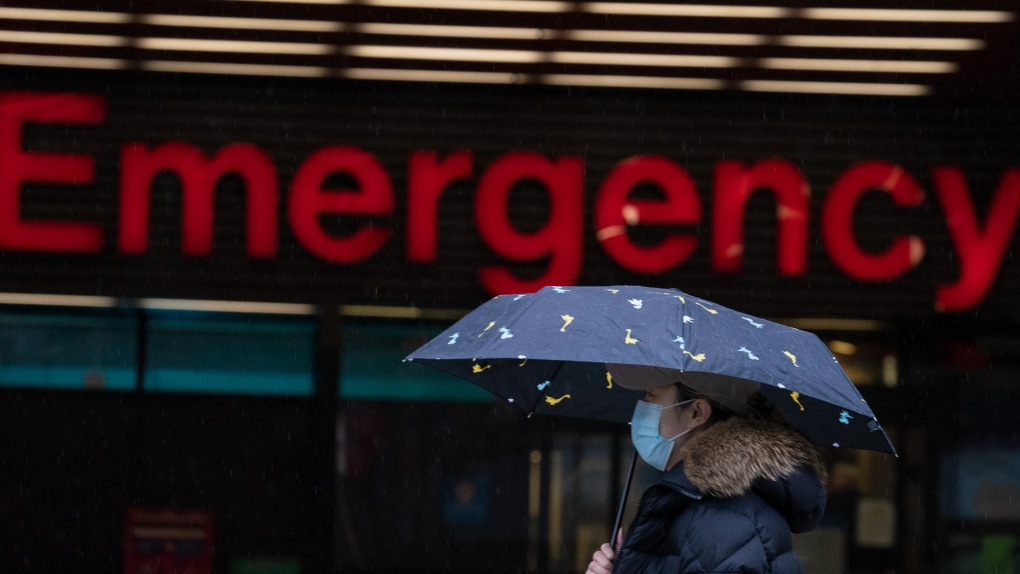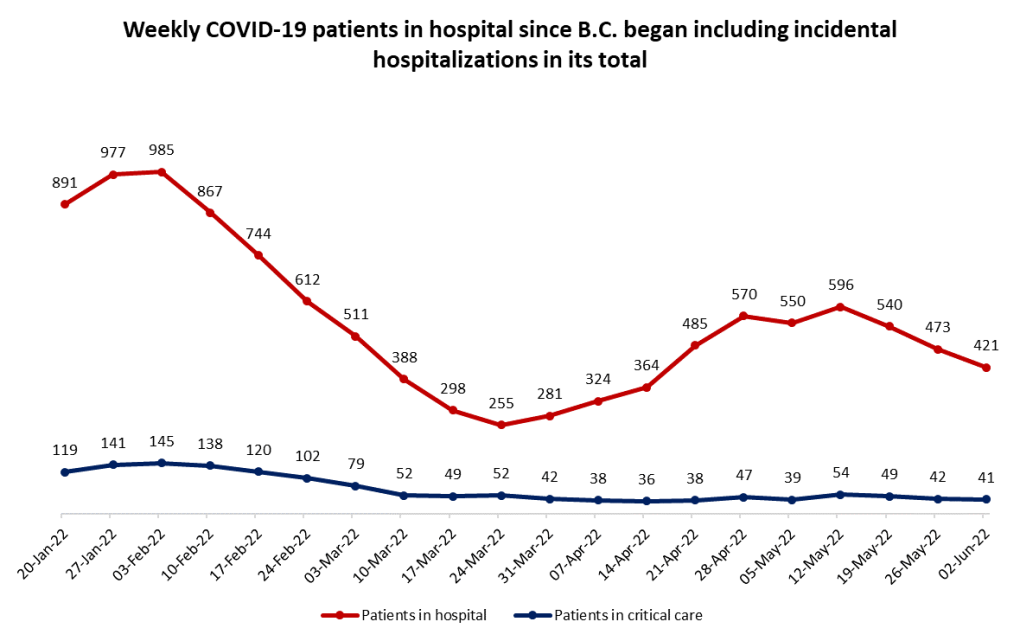Number of COVID-19 patients in B.C. hospitals decreases for 3rd week in a row
 A person wears a protective face covering to help prevent the spread of COVID-19 while walking past the emergency entrance of Vancouver General Hospital in Vancouver, B.C., Friday, April 9, 2021. THE CANADIAN PRESS/Jonathan Hayward
A person wears a protective face covering to help prevent the spread of COVID-19 while walking past the emergency entrance of Vancouver General Hospital in Vancouver, B.C., Friday, April 9, 2021. THE CANADIAN PRESS/Jonathan Hayward
The number of COVID-19 patients in B.C. hospitals has decreased for the third week in a row.
There were 421 test-positive patients in hospital as of Thursday, a drop of 52 from last week, according to the latest numbers on the B.C. Center for Disease Control's COVID-19 dashboard.

That total has fallen by approximately 30 per cent since reaching 596 on May 12, during the height of the sixth wave, and has decreased for four of the last five weeks.
The number of hospitalized coronavirus patients reported by the B.C. government each week includes those with serious illness and those who were admitted to hospital for reasons unrelated to COVID-19, then tested positive incidentally.
Since the province switched to this "census" method of counting hospitalizations in January, the highest number of patients in hospital on a Thursday has been 985, and the lowest has been 255.
The total also includes patients in intensive care. There were 41 such patients as of Thursday, a decrease of just one from last week.
MORE SIGNS OF IMPROVEMENT
Beyond hospital numbers, there are other signs that the worst of the sixth wave has passed.
The BCCDC's dashboard reported just 1,163 lab-confirmed cases of COVID-19 for the week of May 22 to 28, down from 1,358 the previous week. That number has been decreasing in recent weeks along with hospitalizations.
But the true number of daily COVID-19 infections occurring across the province has been unknown since the government severely limited the availability of publicly funded lab testing.
The independent B.C. COVID-19 Modelling Group developed a formula to estimate transmission, and inferred there were approximately 4,700 new cases per day back in May. The most B.C. recorded before the government stop widespread testing back in December was 1,293 in a day.
Officials have also been monitoring transmission by testing wastewater. The BCCDC's latest situation report indicates viral loads decreased at the Lulu Island and Northwest Largely plants for the week ending May 28, compared to the previous week, but held steady at the Annacis Island, Iona Island, and Lions Gate plants.
Viral loads at Lulu Island have decreased for four weeks in a row now, while the Northwest Largely plant has seen decreases for three weeks.
DEATH NUMBERS UNRELIABLE
There were 44 deaths included in the province's latest weekly COVID-19 report, also covering the week ending on May 28, though that number is expected to climb "as data become more complete."
Last week, 42 deaths were initially reported for the week ending on May 21, but that total has since been adjusted up to 72.
Since April 2, the government has been reporting "30-day, all-cause mortality," rather than attempting to separate coronavirus-related deaths from those in which someone died while incidentally infected with COVID-19. Officials have previously said the true totals won't be confirmed until several weeks after the initial reporting.
A new paper published in the Canadian Medical Association Journal has also raised questions about the accuracy of B.C.'s death reporting earlier in the pandemic.
"Excess mortality, COVID-19 and health care systems in Canada" found British Columbia had more excess deaths than any other province during the first 18 months of the pandemic. The authors noted that provinces had different approaches to which deaths were attributed to the virus.
Jens Von Bergmann of the independent B.C. COVID-19 Modelling Group told CTV News this week that it's "very hard to think we haven't been undercounting."
CTVNews.ca Top Stories

Trudeau's 2024: Did the PM become less popular this year?
Justin Trudeau’s numbers have been relatively steady this calendar year, but they've also been at their worst, according to tracking data from CTV News pollster Nik Nanos.
Back on air: John Vennavally-Rao on reclaiming his career while living with cancer
'In February, there was a time when I thought my career as a TV reporter was over,' CTV News reporter and anchor John Vennavally-Rao writes.
The winter solstice is here, the Northern Hemisphere's darkest day
The winter solstice is Saturday, bringing the shortest day and longest night of the year to the Northern Hemisphere — ideal conditions for holiday lights and warm blankets.
What we know about the suspect behind the German Christmas market attack
Germany on Saturday was still in shock and struggling to understand the suspect behind the attack in the city of Magdeburg.
Poilievre writes to GG calling for House recall, confidence vote after Singh declares he's ready to bring Liberals down
Conservative Leader Pierre Poilievre has written to Gov. Gen. Mary Simon, imploring her to 'use your authority to inform the prime minister that he must' recall the House of Commons so a non-confidence vote can be held. This move comes in light of NDP Leader Jagmeet Singh publishing a letter stating his caucus 'will vote to bring this government down' sometime in 2025.
School custodian stages surprise for Kitchener, Ont. students ahead of holiday break
He’s no Elf on the Shelf, but maybe closer to Ward of the Board.
Kelly Clarkson's subtle yet satisfying message to anyone single this Christmas
The singer and daytime-talk show host released a fireside video to accompany her 2021 holiday album, “When Christmas Comes Around” that she dubbed, “When Christmas Comes Around…Again.
Judge sentences Quebecer convicted of triple murder who shows 'no remorse'
A Quebecer convicted in a triple murder on Montreal's South Shore has been sentenced to life in prison without chance of parole for 20 years in the second-degree death of Synthia Bussieres.
16-year-old German exchange student dies after North Vancouver crash
A 16-year-old high school student from Germany who was hit by a Jeep in North Vancouver, B.C., last weekend has died in hospital, authorities confirmed.

































